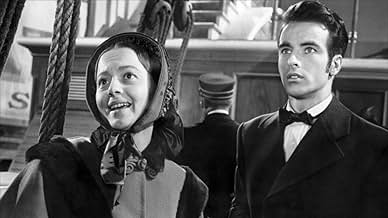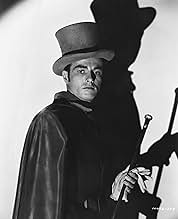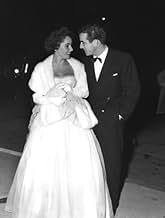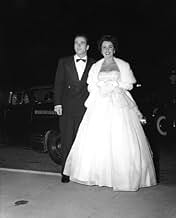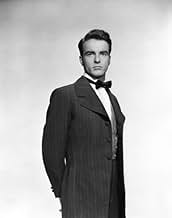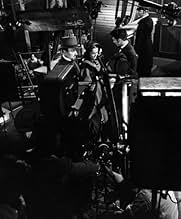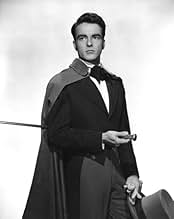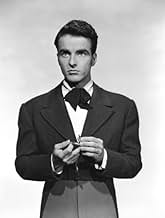NOTE IMDb
8,1/10
18 k
MA NOTE
Une jeune femme naïve tombe amoureuse d'un beau jeune homme, mais son père, qui la maltraite psychologiquement, le soupçonne d'être un coureur de dot.Une jeune femme naïve tombe amoureuse d'un beau jeune homme, mais son père, qui la maltraite psychologiquement, le soupçonne d'être un coureur de dot.Une jeune femme naïve tombe amoureuse d'un beau jeune homme, mais son père, qui la maltraite psychologiquement, le soupçonne d'être un coureur de dot.
- Réalisation
- Scénario
- Casting principal
- Récompensé par 4 Oscars
- 13 victoires et 9 nominations au total
Mary Bayless
- Party Guest
- (non crédité)
Nan Boardman
- French Maid
- (non crédité)
Jack Chefe
- French Waiter
- (non crédité)
Marcel De la Brosse
- French Porter
- (non crédité)
Ray De Ravenne
- French Waiter
- (non crédité)
Avis à la une
Catherine (Olivia de Havilland) is a thoroughly ordinary girl with one thing commend her—her money. That's the view of her father (Ralph Richardson), who believes he is cruel only to be kind. He takes a dim view of the handsome and charming man (Montgomery Clift) who courts her. Surely this idler's only possible motive for proposing marriage is to get her money. Catherine's aunt (Miriam Hopkins) may agree, but believes the two should marry anyway. Catherine is deeply in love, but her fiancé will forever change her view of herself, of her father and of human nature as a whole.
William Wyler directs Augustus and Ruth Goetz's adaptation of their own play, suggested by Henry James's "Washington Square," and it's a fine job by all. We rarely see such a subtle and precise view of people, presented in a way that allows us to draw our own conclusions about them. Is the father villainous and cruel? Is the fiancé a fortune hunter? Do we approve or disapprove of Catherine's decisions throughout the film? We're not told what to think.
De Havilland is fine at conveying the various shades of her many-faceted character. Richardson is excellent, making the most of his mellifluous voice and superb manners. Clift is good, though his diction is lazier than that of his co-stars'. I find Clift smug and unappealing, which doesn't detract from this particular character. Miriam Hopkins, a former leading lady, aged into character parts, gives a performance rich in detail and humor. Highly recommended.
William Wyler directs Augustus and Ruth Goetz's adaptation of their own play, suggested by Henry James's "Washington Square," and it's a fine job by all. We rarely see such a subtle and precise view of people, presented in a way that allows us to draw our own conclusions about them. Is the father villainous and cruel? Is the fiancé a fortune hunter? Do we approve or disapprove of Catherine's decisions throughout the film? We're not told what to think.
De Havilland is fine at conveying the various shades of her many-faceted character. Richardson is excellent, making the most of his mellifluous voice and superb manners. Clift is good, though his diction is lazier than that of his co-stars'. I find Clift smug and unappealing, which doesn't detract from this particular character. Miriam Hopkins, a former leading lady, aged into character parts, gives a performance rich in detail and humor. Highly recommended.
The Heiress (1949)
Another gem from William Wyler. This is the director of so many sparkling, flawless interpersonal dramas it's hard to believe he isn't lionized alongside more famous greats. The problem (as he admits in interviews) is he had no real style of his own. And yet, as the years go by, his "style" begins to clarify a little. Watch "The Little Foxes" or "Detective Story" or this one, "The Heiress," and you'll see an astonishing, complex handling of a small group of people with visual clarity and emotional finesse.
There is no overacting here, and no photographic flourishes to make you gasp. There are no murky shadows or gunfights or even ranting and raving. No excess. What you have here is terrific writing (thanks in part to Henry James who wrote the source story, Washington Square) and terrific acting.
The three leads are all first rate actors, surely. Montgomery Clift a young and rising star, Olivia de Havilland already famous for earlier roles (including a supporting one in "Gone with the Wind"), and the terrific stage actor Ralph Richardson, who received an Oscar nomination for his role. It is de Haviland who is the heiress of the title, and she does tend to steal the show with a performance that you would think would tip into campy excess but which just veers this side of danger and makes you feel for her scene after scene. And she took the Best Actress award for it.
A good director manages to bring the best from the actors, which Wyler clearly does. But he also finds ways to make those performances jump out of the film reality into the movie theater. His fluid, expert way of moving actors around one another, of having them trade positions or look this way or that as they deliver some intensely subtle comeback line, is really astonishing. And easy to miss, I think, if you just get absorbed in the plot. So watch it all.
The story itself is pretty chilling and oddly dramatic (dramatic for Henry James, not for Wyler, who likes a kind of soap opera drama within all his focused restraint). The heiress (de Havilland) is being pursued by a fortune hunting and rather handsome man (Clift) and she doesn't realize his love isn't for real. But the father, with his slightly cruel superiority, sees it all and tries to subtly maneuver his daughter to safety. The result is a lot of heartbreak and surprising twists of motivation.
By the end almost anything can happen, within this upper class world of manners and appropriate reactions, and de Havilland rises to the challenge. It's worth seeing how. Terrific stuff from the golden age of the silver screen, for sure.
Another gem from William Wyler. This is the director of so many sparkling, flawless interpersonal dramas it's hard to believe he isn't lionized alongside more famous greats. The problem (as he admits in interviews) is he had no real style of his own. And yet, as the years go by, his "style" begins to clarify a little. Watch "The Little Foxes" or "Detective Story" or this one, "The Heiress," and you'll see an astonishing, complex handling of a small group of people with visual clarity and emotional finesse.
There is no overacting here, and no photographic flourishes to make you gasp. There are no murky shadows or gunfights or even ranting and raving. No excess. What you have here is terrific writing (thanks in part to Henry James who wrote the source story, Washington Square) and terrific acting.
The three leads are all first rate actors, surely. Montgomery Clift a young and rising star, Olivia de Havilland already famous for earlier roles (including a supporting one in "Gone with the Wind"), and the terrific stage actor Ralph Richardson, who received an Oscar nomination for his role. It is de Haviland who is the heiress of the title, and she does tend to steal the show with a performance that you would think would tip into campy excess but which just veers this side of danger and makes you feel for her scene after scene. And she took the Best Actress award for it.
A good director manages to bring the best from the actors, which Wyler clearly does. But he also finds ways to make those performances jump out of the film reality into the movie theater. His fluid, expert way of moving actors around one another, of having them trade positions or look this way or that as they deliver some intensely subtle comeback line, is really astonishing. And easy to miss, I think, if you just get absorbed in the plot. So watch it all.
The story itself is pretty chilling and oddly dramatic (dramatic for Henry James, not for Wyler, who likes a kind of soap opera drama within all his focused restraint). The heiress (de Havilland) is being pursued by a fortune hunting and rather handsome man (Clift) and she doesn't realize his love isn't for real. But the father, with his slightly cruel superiority, sees it all and tries to subtly maneuver his daughter to safety. The result is a lot of heartbreak and surprising twists of motivation.
By the end almost anything can happen, within this upper class world of manners and appropriate reactions, and de Havilland rises to the challenge. It's worth seeing how. Terrific stuff from the golden age of the silver screen, for sure.
To call this film well-acted is like calling "Citizen Kane" a nice movie and Alfred Hitchcock an "okay" director. William Wyler was known for eliciting excellent performances from his actors (he's responsible for them receiving a record 14 Oscars in acting; more than twice as many as any other director) and in "The Heiress" he's in top form. This movie should be played in every acting class ever taught to show the brilliance of subtlety and range of expressions possible when one is conveying a character's inner emotions.
Olivia De Havilland is a beautiful woman, but you believe she's an ungainly bundle of shy awkwardness in the role of Catherine Sloper. And her transformation to a cruel wounded creature is perfectly believable. And Ralph Richardson as Dr. Sloper and Miriam Hopkins as Aunt Lavinia are letter perfect beside her. Sir Ralph (at least, I THINK he was knighted) can do more with stillness and a flick of an eyebrow than any actor I've ever seen (including Brando, Penn and any other method actor you care to toss into the mix). He was robbed at the Oscars.
Montgomery Clift was beautiful and seductive and, except for a couple of moments where he seemed too 1950s instead of 1850s, just right for the part. He almost holds his own with Sir Ralph when they meet to discuss him marrying Catherine, but he did do better work in "A Place In The Sun" and "From Here To Eternity."
Wyler's simplicity and grace in directing only enhanced the story. The use of mirrors to deepen emotional content (as in when Dr. Sloper, now ill, goes to his office after getting the cold shoulder from Catherine) is stunning. So is his willingness to let a scene play out rather than force along the pacing of the moment, as so many directors do, today (as in when Catherine offers to help her father rewrite his will).
There are no easy answers in this movie. You can think Dr. Sloper is right about Morris and only wants to protect his daughter, or you can see his actions as those of a vindictive man who blames her for the death of his beloved wife (in childbirth). Morris could be a fortune hunter, or he could be a man who does care for Catherine, in his own way, and would make her happy. Or all of the above. The whole movie is so beautifully composed, it's breathtaking. A definite must see for anyone who appreciates great stories well-told.
Olivia De Havilland is a beautiful woman, but you believe she's an ungainly bundle of shy awkwardness in the role of Catherine Sloper. And her transformation to a cruel wounded creature is perfectly believable. And Ralph Richardson as Dr. Sloper and Miriam Hopkins as Aunt Lavinia are letter perfect beside her. Sir Ralph (at least, I THINK he was knighted) can do more with stillness and a flick of an eyebrow than any actor I've ever seen (including Brando, Penn and any other method actor you care to toss into the mix). He was robbed at the Oscars.
Montgomery Clift was beautiful and seductive and, except for a couple of moments where he seemed too 1950s instead of 1850s, just right for the part. He almost holds his own with Sir Ralph when they meet to discuss him marrying Catherine, but he did do better work in "A Place In The Sun" and "From Here To Eternity."
Wyler's simplicity and grace in directing only enhanced the story. The use of mirrors to deepen emotional content (as in when Dr. Sloper, now ill, goes to his office after getting the cold shoulder from Catherine) is stunning. So is his willingness to let a scene play out rather than force along the pacing of the moment, as so many directors do, today (as in when Catherine offers to help her father rewrite his will).
There are no easy answers in this movie. You can think Dr. Sloper is right about Morris and only wants to protect his daughter, or you can see his actions as those of a vindictive man who blames her for the death of his beloved wife (in childbirth). Morris could be a fortune hunter, or he could be a man who does care for Catherine, in his own way, and would make her happy. Or all of the above. The whole movie is so beautifully composed, it's breathtaking. A definite must see for anyone who appreciates great stories well-told.
What a lavish history of films we are fortunate enough to have in this country. And I count "The Heiress" as one of the best. Combine a wonderfully told story with a masterful director (William Wyler), and add to that superb cast, and you have the formula for a masterpiece as we do here.
Olivia de Havilland gives the performance of her life as Catherine Sloper, the socially awkward and homely daughter of surgeon Dr. Sloper (played by Ralph Richardson). She brings such a strong performance as her character evolves from a timid, shy and innocent young lady to a hardened, disappointed and bitter woman. I don't know that I have ever seen an actress give such a convincing evolution, before or since. She truly earned her Oscar win for Best Actress. Richardson also delivers a believable performance as the ruthless father that is extremely disappointed in his daughter, and never fails to let her know it. At the same time, there is a hint of fatherly love below the surface trying to protect his daughter from what he perceives is a fortune hunter in the suitor of Montgomery Clift's character, Morris Townsend.
The photography in the film is amazing as it conveys the deep emotions in the film so adequately. You feel Catherine's loneliness and awkwardness, and the scenes involving the elopement, and later the final rejection, are quite hauntingly portrayed.
One of my favorite lines in movies is from this film when Catherine's Aunt tells her "Can you be so cruel?" to which Catherine coldly replies "Yes, I can be very cruel. I have been taught by masters." This is a film you will want to see multiple times to uncover all the layers and details of the very deep and tragic story of "The Heiress".
Olivia de Havilland gives the performance of her life as Catherine Sloper, the socially awkward and homely daughter of surgeon Dr. Sloper (played by Ralph Richardson). She brings such a strong performance as her character evolves from a timid, shy and innocent young lady to a hardened, disappointed and bitter woman. I don't know that I have ever seen an actress give such a convincing evolution, before or since. She truly earned her Oscar win for Best Actress. Richardson also delivers a believable performance as the ruthless father that is extremely disappointed in his daughter, and never fails to let her know it. At the same time, there is a hint of fatherly love below the surface trying to protect his daughter from what he perceives is a fortune hunter in the suitor of Montgomery Clift's character, Morris Townsend.
The photography in the film is amazing as it conveys the deep emotions in the film so adequately. You feel Catherine's loneliness and awkwardness, and the scenes involving the elopement, and later the final rejection, are quite hauntingly portrayed.
One of my favorite lines in movies is from this film when Catherine's Aunt tells her "Can you be so cruel?" to which Catherine coldly replies "Yes, I can be very cruel. I have been taught by masters." This is a film you will want to see multiple times to uncover all the layers and details of the very deep and tragic story of "The Heiress".
10Ritag2
The Heiress has to be one of the greatest movies ever made. There is nothing about it that I would change. The cast is perfect. Montgomery Clift is so wonderful as Morris Townsend. His physical beauty makes it easy to understand how someone as gauche as Catherine Sloper could overcome her shyness and respond to him. Olivia de Havilland is almost too good looking to be the unattractive Miss Sloper, however her great acting overcomes her beauty, and the viewer readily accepts her in the part. Ralph Richardson is perfect as Dr. Sloper. With his disdain for his daughter and his idealization of her dead mother, it is easy to see how his attitude has frozen his daughter in her insecurity about everything that she does. Miriam Hopkins is the perfect airhead social climber who does have affection for her niece, but becomes so wrapped up in the overall romance of the situation that she doesn't act in the best interests of her niece but in the best interests of the romantic drama that is unfolding around her. In her biography, Edith Head talks about researching and designing the clothes for this movie. Certainly the costumes greatly enhance Olivia de Havilland's ability to play this part and be accepted as the plain and graceless Catherine Sloper. A great movie that shouldn't be missed.
Le saviez-vous
- AnecdotesDirector William Wyler shot 37 takes of Olivia de Havilland carrying her suitcases up the stairs. Only after the final shoot, whereupon she briefly stopped on the second flight of stairs and leaned on the handrail for a couple of seconds, did Wyler declare that this was the take he wanted to print.
- GaffesThis story takes place at the end of the 1840s, but none of the men wear the cravats--material bound around the neck and tied in either the front or back--that were fashionable in that period; instead they wear neckties and bow ties, which did not come into fashion until the late 1850s.
- Citations
Aunt Penniman: Can you be so cruel?
Catherine Sloper: Yes, I can be very cruel. I have been taught by masters.
- ConnexionsFeatured in AFI Life Achievement Award: A Tribute to William Wyler (1976)
Meilleurs choix
Connectez-vous pour évaluer et suivre la liste de favoris afin de recevoir des recommandations personnalisées
Détails
- Date de sortie
- Pays d’origine
- Langues
- Aussi connu sous le nom de
- La heredera
- Lieux de tournage
- Société de production
- Voir plus de crédits d'entreprise sur IMDbPro
Box-office
- Budget
- 2 600 000 $US (estimé)
- Montant brut mondial
- 158 $US
- Durée1 heure 55 minutes
- Couleur
- Rapport de forme
- 1.37 : 1
Contribuer à cette page
Suggérer une modification ou ajouter du contenu manquant

Lacune principale
By what name was L'héritière (1949) officially released in India in English?
Répondre

